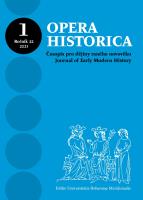Úskalí válečné solidarity.
Pitfalls of war solidarity
Jan Vilém Mičan of Klinštejn and Roztoky during the Bohemian Revolt
Author(s): František KorešSubject(s): Economic history, Military history, Political history, 17th Century
Published by: Jihočeská univerzita v Českých Budějovicích
Keywords: Jan Vilém Mičan of Klinštejn and Roztoky; Nové Hrady; war; Bohemian Revolt; solidarity; social mobility; conflict; lower nobility
Summary/Abstract: Between 1618 and 1620, a period of increased power and confessional tension in the society of the Bohemian Estates culminated in an open rebellion against the ruling dynasty. While adequate research attention has already been paid to the political, religious and economic background of the central events of this large-scale conflict, research to date has not sufficiently taken into account the problems which the war brought to its direct and indirect participants of noble origin. In contrast to publicly active individuals in particular, the thinking of rank-and-file representatives of higher status comprised noticeably different experiences. The actions of these people were subordinated to the care of their own families, material background and corresponding social status rather than the goals and ideals of the anti-Habsburg opposition. The fact that most of them did not feel that they were only threatened by enemies in that direction was evidenced by a remarkable dispute that occurred in 1620 between members of the Estates’ camp. Its main actor was the impoverished nobleman Jan Vilém Mičan of Klinštejn and Roztoky, who was entrusted with the administration of the Nové Hrady estate in the region of Chrudimsko which had been confiscated from Catholic opponents of the uprising. Although the revenue from the local holdings was supposed to meet the needs of the estates of the regions of Bechyňsko and Prácheňsko which had been affected by military raids by the imperial army, this formerly powerless representative of the South Bohemian estate saw in them, according to later accusations, an opportunity for illegal enrichment. In addition to specific evaluation of his actions, the statements and attitudes of individual participants contradicted the finding that under forced circumstances even the mostly petty nobility was able to use well-considered defence strategies in order to achieve the fulfilment of their property claims. However, the case in question also highlighted the changes that the ongoing state of war caused to the structure of the social order, established ways of communication and a system of noble values that had been consolidated over generations. The present contribution thus attempts to reveal another possible perspective on the interpretation of the events that immediately preceded the Battle of White Mountain from a historical-anthropological point of view.
Journal: Opera Historica
- Issue Year: 24/2023
- Issue No: 1
- Page Range: 52-81
- Page Count: 30
- Language: Czech

